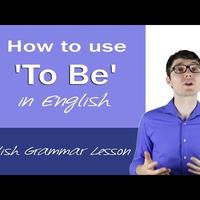How to Use To Be in English - Using Be in English Grammar Lesson
Hi.
My name is Rheedan.
Welcome to Oxford Online English!
Today, you can learn about the most important verb in English: "to be."
You'll learn how to use "be" in simple sentences and questions.
The verb, "be," is everywhere in English.
We use it all the time, so you need to know how to use "be" correctly.
Do you know the sentence: "To be or not to be, that is the question."
It's from Shakespeare's "Hamlet."
It's only 10 words long and uses the word "to be" three times.
So if you want to speak well, practicing the verb "to be" will help your English.
How to use different forms of "be."
"Be" has different forms.
Let's look.
We say, "I am.
You are.
He/she/it is.
We are.
You are.
They are."
Do you know these forms?
If not, repeat them again and again until you know them perfectly.
Let's do it one more time.
"I am.
You are.
He/she/it is.
We are.
You are.
They are."
What about my brother?
My brother am?
My brother are?
My brother is?
Which is correct?
My brother = he.
My brother is.
What about the cups?
The cups am?
The cups are?
The cups is?
Which is correct?
The cups = they.
The cups are.
Next, let's look at how to make simple sentences with "be."
How can we use "be?"
There are many ways.
We can use "be" with a number: "I am 29 years old."
"You are 190 centimeters tall."
"It is 5:00."
We can use "be" with a noun, to say what something is: "He is a doctor."
"She is a student."
"It is a cookbook."
You can use "be" with an adjective, like hungry or quiet: "We are hungry."
"You are very quiet."
"They are German."
OK, what if you want to make a negative sentence?
It's easy to make negative sentences with "be."
Just add "not" after the verb.
"I am 29 years old --> I am not 29 years old."
"Sarah is a student --> Sarah is not a student."
"We are hungry --> We are not hungry."
What about, "He is a doctor."?
Can you make it negative?
"He is not a doctor."
Easy, right?
Good.
Let's look at how to make short forms, contractions, with "be."
When we speak, we often make short forms, also called contractions, with "be."
What am I talking about?
You saw the example: "I am 29 years old."
We don't usually say this.
We usually say, "I'm 29 years old."
"I'm" is a short form, or contraction.
We take two words and put them together.
This is easier to say.
Let's look at some more short forms with the verb "be."
"I am --> I'm."
"You are --> You're."
"He is --> He's."
"She is --> She's."
"It is --> It's."
"We are --> We're."
"They are --> They're."
You can also make short forms with nouns.
"Sarah is a student --> Sarah's a student."
"My camera is Japanese --> My camera's Japanese."
What about short forms with negatives?
Let's look.
"I am not --> I'm not."
"You are not --> You aren't; You're not."
"He is not --> He isn't; He's not."
"She is not --> She isn't; She's not."
"It is not --> It isn't; It's not."
"We are not --> We aren't; We're not."
"They are not --> They aren't; They're not."
Let's look at some examples: "I am not 29."
"I'm not 29."
"He is not a doctor."
"He isn't a doctor," or: "He's not a doctor."
OK, your turn.
"It is not a cookbook."
What are the two short forms?
"It isn't a cookbook," or: "It's not a cookbook."
Let's do one more: "They are not German."
Can you make the short forms?
"They aren't German," or: "They're not German."
When you speak English, remember to use short forms with "be."
You'll sound more natural.
Let's learn to do one more thing with "be."
Let's see how to use "be" to make simple yes/no questions.
Look at the sentence: "He is a doctor."
Can you make a yes/no question from this sentence?
"Is he a doctor?"
What happened?
We moved the verb "be" to the beginning.
Let's look at another example.
"Sarah is a student."
Can you make the question?
"Is Sarah a student?"
OK, one more, a bit different: "You are Italian."
Can you make the question?
"Are you Italian?"
The same thing happens.
Just move "be" to the beginning.
What about, "They are German?"
Can you make the question?
"Are they German?"
Same idea again.
Not too difficult, right?
Okay.
Let's review what we've studied in this class.
Can you remember what you learned in this lesson?
We saw how to make simple sentences with "be," how to make short forms with "be," and how
to make simple questions with "be."
Remember, you can watch the video again to review the topic if you want to.
Want more practice?
Look at the full lesson on our website: www.oxfordonlineenglish.com.
That's the end of the lesson.
Thanks very much for watching.
I hope you found it useful.
See you next time!

